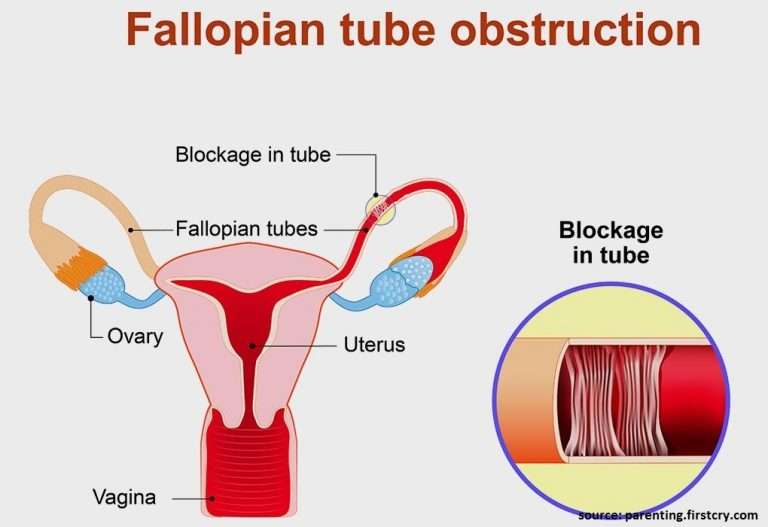Many women in India suffer from blocked fallopian tubes. Are you also suffering from this condition? In this article, we are discussing blocked fallopian tubes and how you can achieve a successful pregnancy.
Let us start by understanding what a fallopian tube blockage is?
Fallopian tube blockage-What is it?

Fallopian tubes are female reproductive organs that link the ovaries and the uterus. Every month this happens in ovulation roughly during the middle of a menstrual cycle. The fallopian tubes carry an egg from the ovary and send it to the uterus.
Conception also happens inside your fallopian tube. If the sperm fertilizes the egg, it will travel through the fallopian tube to your uterus for implantation.
When there is a fallopian tube blockage, the sperm’s path to reach the eggs and fertilized egg to reach your uterus is blocked.
Now that you understand what a fallopian tube blockage is, let us learn some of its symptoms.
Symptoms of blocked fallopian tubes
Blocked fallopian tubes usually do not cause any symptoms. You might not know that you have blocked tubes until you start trying for pregnancy.
In some cases, blocked fallopian tubes cause mild, regular pain on either side of the abdomen. It generally occurs in a blockage type known as hydrosalpinx. In hydrosalpinx, fluid fills and expands the blocked fallopian tube.
Conditions that cause blocked fallopian tubes have specific symptoms. For instance, endometriosis causes extreme pelvic pain and heavy periods. This raises your chances of having a blocked fallopian tube.
Now that you know the symptoms let us discuss the causes.
Causes of blocked fallopian tubes
Scar tissue or pelvic adhesions can often block fallopian tubes. Many factors can cause this, including:
- Pelvic inflammatory disease: The disease causes hydrosalpinx or scarring. In India, it is commonly due to tuberculosis (TB). TB can be diagnosed by doing an Endometrial TB-PCR test or by doing the laparoscopic test on the patient.
- Endometriosis: Endometrial tissue develops within your fallopian tubes and causes a blockage. When endometrial tissue grows on the other organs’, it can lead to adhesions that block your fallopian tubes.
- Certain sexually transmitted infections (STIs): Gonorrhea and Chlamydia lead to scarring and progress to pelvic inflammatory disease.
- Past ectopic pregnancy: It can scar your fallopian tubes.
- Fibroids: These growths can block your fallopian tube, especially where the tubes meet the uterus.
Now that we know the causes of blocked fallopian tubes let us understand how it affects your fertility.
Effect on fertility
Blocked fallopian tubes are a common cause of infertility. An egg and sperm connect in your fallopian tube for fertilization. So, a blocked fallopian tube stops them from coming in contact.
If both tubes are entirely blocked, pregnancy is impossible without treatment. If the fallopian tubes are half blocked, you might get pregnant. However, this would increase the risk of an ectopic pregnancy.
It is challenging for a fertilized egg to travel from a blocked fallopian tube to your uterus. In these situations, your specialist might suggest in vitro fertilization (IVF).
If just one of your fallopian tube is blocked, the blockage likely will not affect fertility as the egg can travel through your unaffected fallopian tube.
How do I know if my fallopian tubes are healthy?
You will be aware of the condition of your fallopian tubes. It is because you will experience some of the other symptoms. In some cases, women can have damaged fallopian tubes without having any symptoms.
Fortunately, specialists have created several quick and proper assessments for all fertility aspects. These tests not only cover levels of egg reserves and your uterus’s health but also determine if the fallopian tubes are functioning as they should.
The specialist will check if there is a path for the egg to travel from the fallopian tube to uterus. The specialist will test the fluid passage or dye down the fallopian tube using an X-ray machine (popularly called HSG – hysterosalpingography) or by using an ultrasound machine (HyCoSy – Hystero-Contrast-Salpingography).
It can also be diagnosed by performing laparoscopy/hysteroscopy on the patient under anaesthesia.
You can also provide the specialist with your medical history. It helps them in determining if any underlying medical condition is causing a blockage in your fallopian tubes.
What will be the treatment if my fallopian tubes are blocked?
You should treat the cause causing the tubal blockage such as infections (chlamydia or tuberculosis or endometriosis or fibroids). Normally, endometriosis and fibroids can be treated by doing an operative laparoscopy and hysteroscopy.
If during laparoscopy, tubes are normal but blocked, then we can try to open them bypassing the guidewire through the tubes. If all other treatments fail to achieve pregnancy, one can go in for IVF.
In the IVF procedure, your egg does not have to travel through the fallopian tube. It is extracted directly from the ovaries and fertilized in a lab. After that, the fertilized embryo is placed in your uterus.
The good news is that any problems with your fallopian tubes are bypassed, helping you in achieving a successful pregnancy.
Blocked fallopian tubes cause infertility; however, it is possible to have a child. IVF can help you conceive and fulfil your dreams of becoming a mother. Visit your IVF centre to learn more about the treatment and how it can help your condition.

